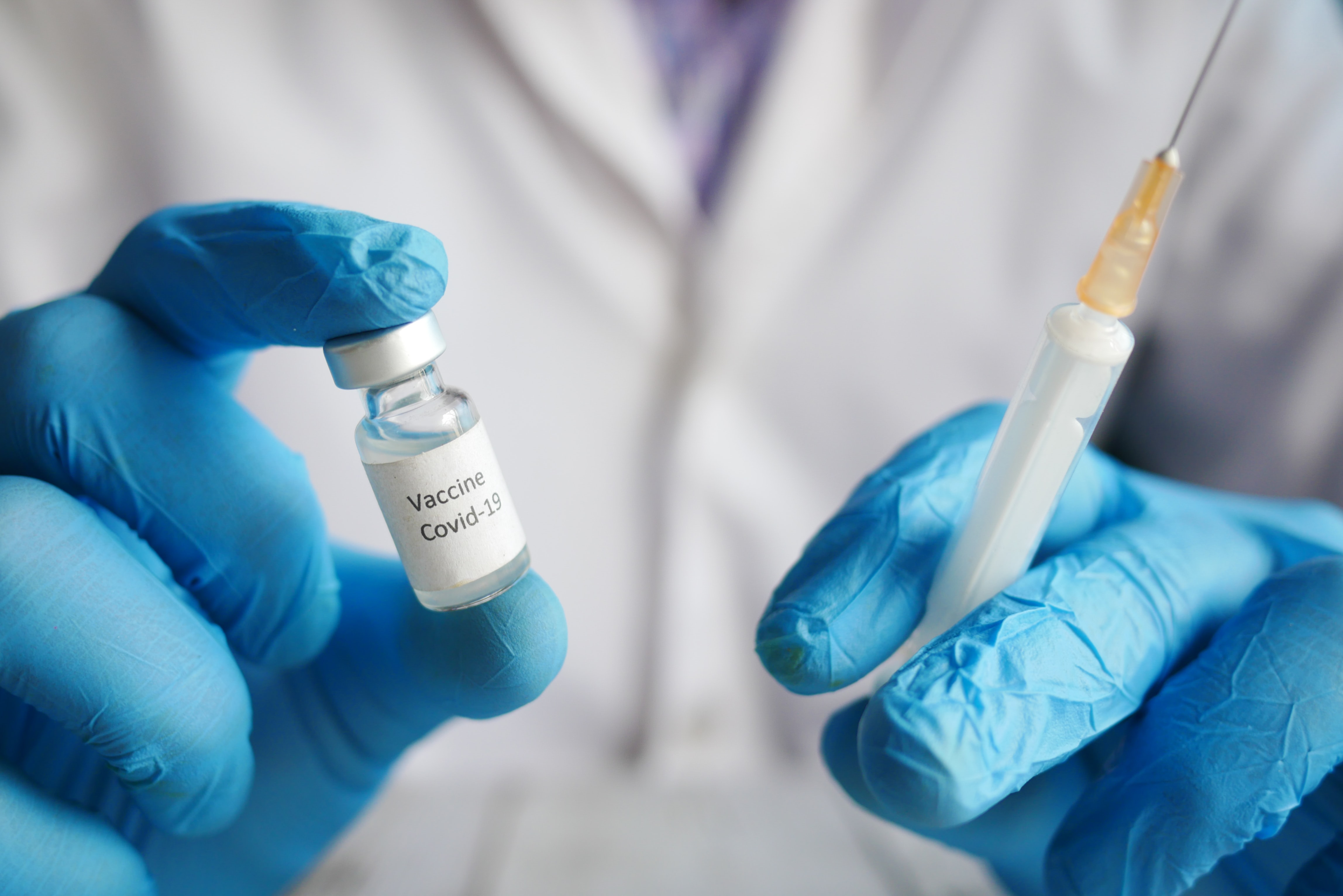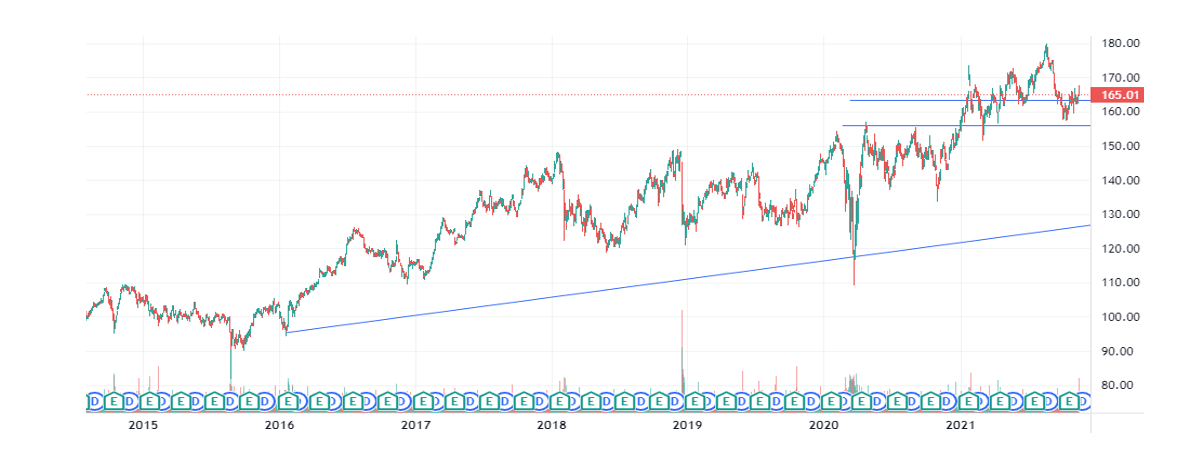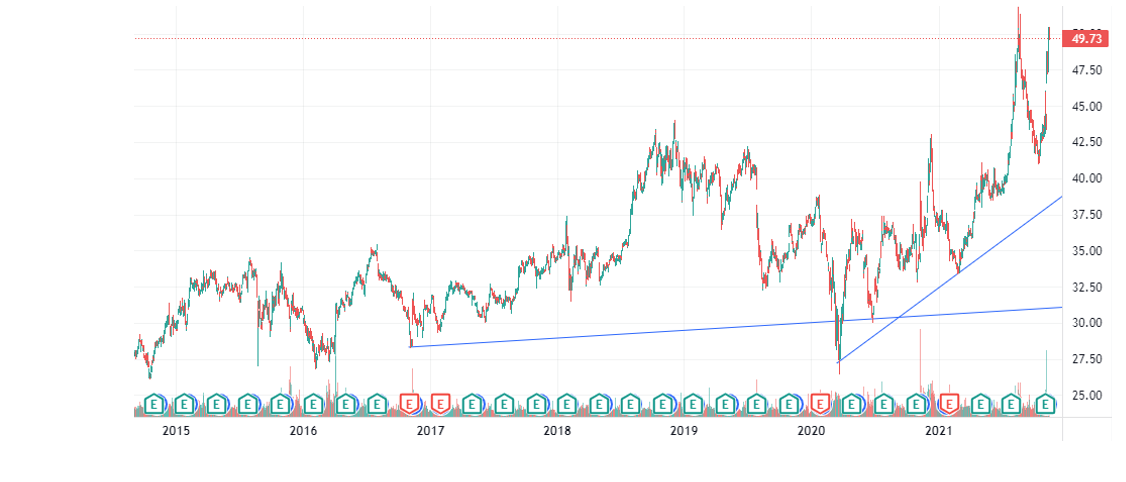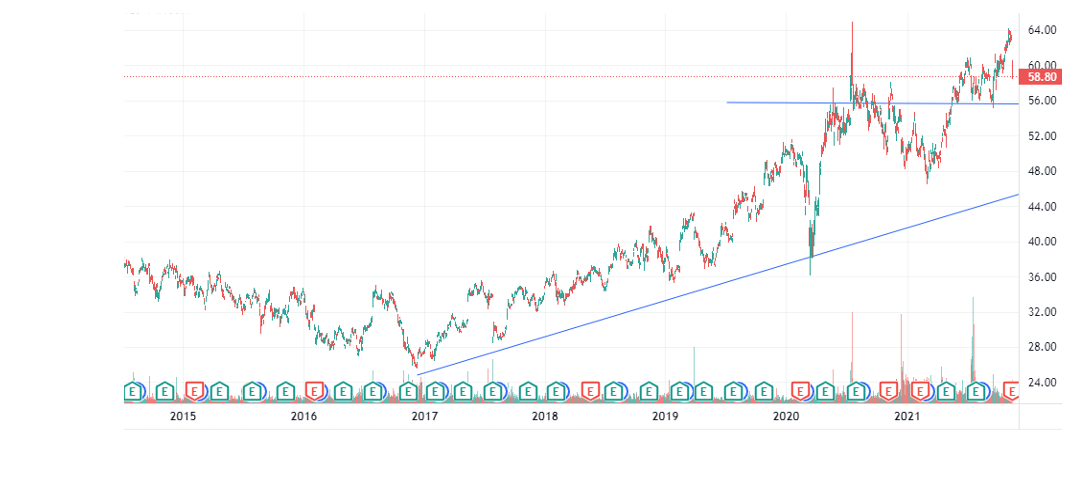Kockázati figyelmeztetés: A pénzügyi különbözeti ügyletek (CFD-k) összetett eszközök, és a tőkeáttétel miatt magas kockázattal járnak, ami gyors pénzügyi veszteségekhez vezethet. Ennél a szolgáltatónál a lakossági befektetői számlák 72.76%-án pénzügyi veszteség keletkezik CFD-kereskedés során. Fontolja meg, hogy megérti-e, hogyan működnek a CFD-k, és hogy megengedheti-e magának a magas pénzügyi veszteség kockázatát. Kérjük, olvassa el a Kockázati Tájékoztatót.


The Vaccine Victors – Where are They Now?
Johnson & Johnson
The global American pharmaceutical and consumer goods firm has been growing consistently over the last two decades, as it has been a household name in the pharma industry for many years. Its market capitalization currently values the company at $434.4 billion, which is 4.85% more than the year before. In the third quarter of this year, total sales grew 10.7% to $23.3 billion, thanks to its COVID-19 vaccine sales which started to pick up in the quarter, generating $502 million. This is almost double from what the company generated in the first half of 2021, pulling in $264 million from its single-shot vaccines.
 *
*
Looking at the stock of Johnson & Johnson (NYSE: JNJ), it can be seen that both short & long-term trends are neutral, with a slightly positive trajectory. The peak of the COVID-19 outbreak plummeted their stock price by over 20% in a span of almost two months, but has recovered heavily with the increased popularity of its vaccine shots, predominantly in the United States.*
More is yet to come from Johnson & Johnson. The world’s biggest maker of health products announced plans to split its consumer products from its pharmaceutical and medical device operations, into two public companies. In doing so, the pioneering company is aiming to “accelerate growth and improve healthcare outcomes for people around the world”, as stated by outgoing CEO Alex Gorsky.
Pfizer/BioNTech
Pfizer is one of the big pharma companies which has taken the world by storm. The New-York based business created very well-known drugs, like Advil, Viagra, Xanax & Lyrica. It operates in 180 countries, manufacturing more than 350 pharmaceuticals. In response to the coronavirus pandemic, Pfizer partnered with BioNTech in April 2020 to develop a vaccine, which was the first to receive emergency use authorization from the FDA (U.S. Food and Drug Administration) for its vaccine in December of 2020.
The company is currently valued at $278.2 billion, with its market capitalization growing 36.3% compared to last year’s market cap valuation. There are several reasons which explain this tremendous 1-year growth. To begin with, the company has been exceeding analyst expectations with regards to earnings per share and revenue. In the last quarter, Pfizer generated $24.1 billion in revenue, which is 6.72% larger than analyst predictions. The quarter before, it beat expectations by 1.45% regarding revenue, and over 10% when examining its earnings per share. Much of its success stems from the growing popularity of the Pfizer household brand, regarded as the best-selling COVID-19 on a worldwide scale. As a matter of fact, worldwide sales of its trusted vaccine were $19.927 billion, with the company forecasting 2021 sales to hit the $33.5 billion mark.*
 *
*
When examining the Pfizer (NYSE: PFE) stock from a technical perspective, both the short & long-term trends are positive, outperforming 78% of 243 stocks in the same industry. When COVID-19 was at its most dangerous levels, the share price of Pfizer declined 25%, but despite choppy trading sessions, the stock value is gaining and is moving upwards. The future looks bright for Pfizer. The drugmaker is seeking to sign more vaccine deals with countries, which can potentially drive sales even higher for the years to come.[1]
Moderna
The pharmaceutical and biotechnological company is considered the youngling in this analysis. The company only went public by the end of 2018, 7 years after establishment. The company exhibited exceptional & impressive growth the past two years, currently valued at $93.73 billion, 126% more than the figure of 2020. The medical company enjoyed surging popularity, for its efforts in tackling the COVID-19 pandemic by manufacturing the coronavirus immunization shot. Its worldwide vaccine sales generated $5.93 billion, with U.S. sales amounting to 58% of total revenue. Things however, took a negative turn for the American company with the tide turning against it. Down 50% from its highs, the stock took a major hit since it cut its 2021 sales forecast for its COVID-19 vaccine by up to $5 billion, as the company is facing difficulties in increasing production of its two-dose drug. As a result, the Moderna (NYSE: MRNA) stock has been underwhelming for traders & investors the past two months.*
AstraZeneca
Last but not least, AstraZeneca has penetrated the industry in the unprecedented times of the coronavirus pandemic. The British-Swedish multinational pharmaceutical and biotechnology company is valued at $182.19 billion, up 40% since last year, making it the world’s 68th most valuable company by market cap. The business has begun accelerating since 2017, and has grown exponentially during the peak of COVID-19, due to its viral vector shot. The AstraZeneca-Oxford coronavirus vaccine generated $1.135 billion in global sales, but gains were capped as their vaccine is not currently approved in the United States.
 *
*
The AstraZeneca stock (NASDAQ: AZN) is one with great potential in the short term. Their stock is exhibiting neutral trajectories for the long run, but this can change very soon. The company is creating a separate division for vaccines and antibody therapies, so it can focus on COVID-19 treatment. The new division will combine research & development, manufacturing, as well as medical & commercial teams. Ultimately, this can push the share price of the British-Swedish pharma leader upwards at a faster rate.[2]
Conclusion
The big pharma businesses which emerged victorious from the COVID-19 pandemic have been performing quite well the past year, despite the coronavirus settling down in major economies. The future remains uncertain for Moderna, however, as it has failed to battle out contemporary analyst expectations regarding the success of its vaccine sales and other business endeavors.
[1,2] Forward-looking statements are based on assumptions and current expectations, which may be inaccurate, or based on the current economic environment which is subject to change. Such statements are not guaranteeing of future performance. They involve risks and other uncertainties which are difficult to predict. Results could differ materially from those expressed or implied in any forward-looking statements.
*Past performance is no guarantee of future results.